None of them had anything to do with the violence at Bhima Koregaon, where they were not even present, points out Aakar Patel.
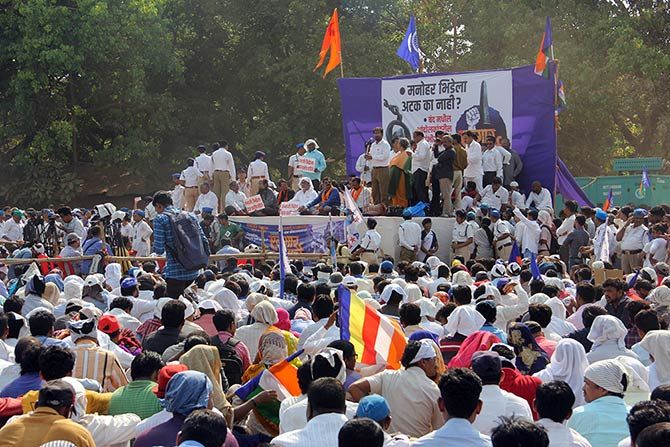
Stan Swamy, who died a few days ago after being denied bail in the Bhima Koregaon case, was a Tamilian priest who spent decades working with the Adivasis in Jharkhand.
Before that he was director of the Indian Social Institute in Bangalore.
So why was he in jail for an event in Pune? The Bhima Koregaon case is five separate and unrelated things.
The first was an event called Elgar (or Yalgar, meaning battle cry) Parishad on 31 December 2017 in Pune.
Speakers at the gathering included former high court judge BG Kolse-Patil and P B Sawant, a former Supreme Court judge.
Jignesh Mewani, the independent MLA from Gujarat and Umar Khalid, the activist from JNU also spoke. Members of the Kabir Kala Manch, who are artists-activists, also participated.
The second event was the following day, 1 January 2018.
This was the 200th anniversary of the Battle of Koregaon Bhima, a suburb of Pune on the Bhima river where on 1 January 1818, the British defeated the remnant of the Maratha empire.
The British side had many Dalit Mahar soldiers who overpowered a larger army led by the Brahmin Peshwa.
Since 1927 when B R Ambedkar visited the village to speak of the victory, hundreds of thousands of Dalits came to Koregaon Bhima each year to gather at the obelisk raised to mark the battle.
But in 2018 there had been tension because of events in the neighbouring village of Vadhu Budruk.
This had to do with who had cremated Sambhaji, the son of Shivaji who was executed by Aurangzeb in 1689 near Koregaon Bhima.
The Mahars claimed it was one of them, Gopal Govind, who had cremated the Maratha in defiance of Aurangzeb's orders.
This offended the Marathas, who claimed two of their community had performed the rituals.
Govind's tomb in Vadhu Budruk, was in the same village square as Sambhaji's.
On 28 December a board was placed over Govind's tomb, claiming the feat of his cremation of Sambhaji.
The next day Govind's tomb was desecrated: The board was removed and the umbrella structure over the tomb was damaged.
A complaint was filed by the Dalits under the Scheduled Castes/Scheduled Tribes Prevention of Atrocities Act against individuals
The Koregaon Bhima panchayat asked its residents to boycott the event of 1 January and called for shops to remain shut.
That morning violence broke out between Dalits, who said they were attacked by a group carrying saffron flags and the local Marathas, who said they had been attacked by the Dalits.
One Maratha was killed. The violence spread to other towns in western Maharashtra and 300 Dalits, including some children, were held by the Mumbai police.
The third event was a police complaint, filed a few days later, by a man who said the agenda of the Elgar Parishad event was to 'mislead the Dalit community, to convert them to Maoist thought... and adopt the path of violence" and that "through their publications, books and speeches, they want to increase enmity in society'.
The man who filed the complaint, Tushar Damgude, said he followed a 'simple' rule for his Hindutva: 'We should keep things which are helpful for Hindus; rest should be abandoned.
It was on the basis of this complaint that the police began arresting the activists, who had nothing to do with, and were not present at, the Bhima Koregaon.
The fourth event was a report produced by an RSS organisation called the Forum for Integrated National Security, whose secretary general, Seshadri Chari, was on the BJP's national executive committee.
This report said there was a Maoist strategy to lure people into joining 'mass organisations' concerned about such issues as caste, justice and equality.
Such organisations would then help Maoists recruit for the final armed struggle against the State, the report, released on 9 March 2018 said.
Another report by the same author was submitted to then Maharashtra chief minister Devendra Fadnavis in April.
In May, the UAPA law was added to the Bhima Koregaon case.
On 6 June, the Maharashtra police arrested five people including Dhawale of the Republican Panthers, lawyer and Dalit activist Surendra Gadling, scholar Mahesh Raut, who worked on Adivasi rights, assistant professor of English at Nagpur University Shoma Sen and Rona Wilson of JNU who worked with the Committee to Release Political Prisoners.
They were described by the police as the 'top brass of the urban Maoists'.
The police say they found a letter in Wilson's house dated July 2017 which said: 'Comrade Kisan and few other senior comrades have proposed concrete steps to end Modi-Raj. We are thinking along the line of another Rajiv Gandhi type incident.';
On the basis of this material the police arrested Sudha Bharadwaj, who studied mathematics at IIT Kanpur and gave up her US citizenship at age 18, Gautam Navlakha an author who also wrote for the Economic and Political Weekly, Anand Teltumbde, assistant professor at the Goa Institute of Management and married to a grand-daughter of Ambedkar, Arun Ferreira, a lawyer who was defending the accused in this case, Vernon Gonsalves, a professor of business management and economics at Ruparel College and HR College of Commerce and Economics, Varavara Rao, an author and poet who had been a lecturer on Telugu literature, Hany Babu, a professor of linguistics at Delhi University, three members of the Kabir Kala Manch, Sagar Gorkhe, Jyoti Jagtap and Ramesh Gaichor were arrested, and Stan Swamy, the 83-year-old Jesuit and theologian.
None of them had anything to do with the violence at Bhima Koregaon, where they were not even present.
The case is said to be sensitive because of the allegation of the assassination plot, but the trial has not started.
Last year, the BBC carried a report on Stan Swamy under the headline 'The oldest person to be accused of terrorism in India'.
Aakar Patel is a columnist and writer and you can read Aakar's earlier columns here.
Feature Presentation: Aslam Hunani/Rediff.com
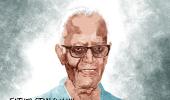


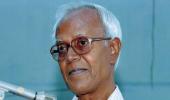




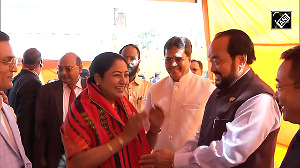
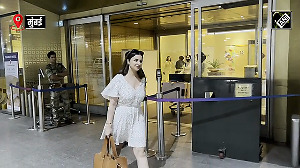
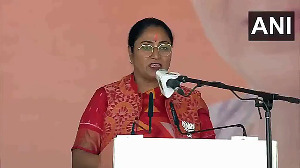
 © 2025
© 2025